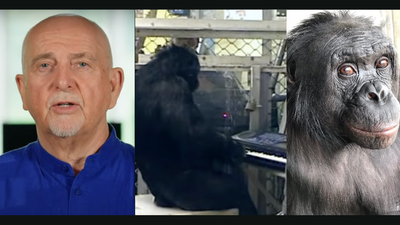Like many people, I was surprised when NBC put Community, a sitcom about life at a community college in Colorado, on indefinite hiatus Monday afternoon. Unlike many people, I've never seen a single episode of Community. Perhaps viewers really loved the acting, or perhaps they thought the writing was top-notch—I don't know. I don't have a television and Netflix takes up a lot more of my bandwidth than Hulu. But while I had never spent one second watching Community, I do spend a whole bunch of time online—particularly on Tumblr and Twitter, where for the past two years I've been inundated with jokes about, references to, and GIFs made from episodes of Community. All this time I thought the show was a hit, but it turns out the internet can be deceptive.
Call it the "reblog effect on perception": People have created blog after blog after blog dedicated to Community appreciation, and the posts from those blogs are reblogged and commented on until the comments stretch to 50 times the length of the original post. The stars of Community have widely followed Twitter feeds, from which they issue tweets that thousands of people retweet or reply to with statements like "please don't ever leave my television screen!" Internet magazines like Salon write glowingly of Community, from every possible angle to keep the fawning fresh. Those articles are then tweeted and blogged about so that the fans might have their say about what the writers are saying. Eventually it becomes hard to remember that Community's ratings are decidedly poor, and that they always have been. "Man," I would say to myself on Friday mornings, scrolling through my Tumblr feed and seeing waves of Community in-jokes from the night before, "that show Community is huge." But it wasn't Community that was huge; it was the web.
According to the latest data from the Pew Internet Project, 78 percent of American adults are now online. And last year a quarter of internet users said they "use Twitter or another service to share updates about yourself or to see updates about others." All those people with all their highly simplistic microblogging platforms means that news travels fast about everything online, but especially news about what culture reveres most: movies, music, politics, and, yes, TV.
But if so few people are watching Community, wouldn't that mean that even fewer are talking about Community online, as far more Americans own TVs than computers? While it's probably true that more people watch a particular TV show than blog about it, relatively low viewership still leaves plenty of people cluttering your Twitter timelines and Tumblr feeds with anecdotes about how great it is, especially since the advent of reblogging has made it effortless to redistribute someone else's praise or GIF or funny picture. And with more people than ever streaming TV shows online (whether legally or not), it stands to reason that their proximity to a computer while watching a program makes them even more eager to express their joy via the internet (this streaming also makes it harder for companies like Nielsen to get accurate ratings estimates, which may be part of the reason Community is in trouble in the first place).
The real rub of the reblog effect is the creation of an internet echo chamber. While technology allows us to access news and opinions from hundreds of millions of diverse people around the world, the reality is that we cull our Twitter and Tumblr groups to match our sensibilities, just as we do with our offline friends. Many of the people I intentionally follow online like Community, and I made the mistake of assuming that my Twitter and Tumblr associates were a cross-section of America. Offline I'd never dare think that what my friends and I like is representative of everyone else's preferences. But on the internet, we've convinced ourselves we're seeing the world, while actually seeing tiny subcultures we've created around the same biases and preferences we have offline.
TV Guide says the most popular TV show in America is Dancing with the Stars, whose Twitter feed isn't followed by a single person I follow.On the other hand, dozens of my Twitter friends follow Donald Glover, a star on Community. Community was never popular, my buddies just all wished it was.













